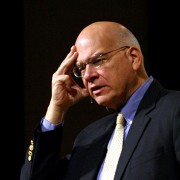The prophet has a stern word, a severe word, a timely and tumultuous word which he speaks into spiritual confusion, moral compromise, and carnal indifference. The pastor faithfully, systematically, and regularly expounds the timeless truths of the Bible week in and week out to a congregation of wheat and tares. Are the roles of prophet and pastor mutually exclusive? The OT says, “No.”
In the OT, the teaching office was the domain of the priests. They were not only to officiate at the altar, they were also to teach the law of Moses and make its ordinances, statutes, commandments, warnings, penalties, and blessings known. Consider the following-
God speaking to Aaron, of his sons –
LEV 10:11 “… teach the sons of Israel all the statutes which the LORD has spoken to them through Moses.”
Speaking of the priests –
DT 3:10 “They shall teach Your ordinances to Jacob, and Your law to Israel. They shall put incense before You, and whole burnt offerings on Your altar.”
Speaking to the priests –
MAL 2:7 “For the lips of a priest should preserve knowledge, and men should seek instruction from his mouth; for he is the messenger of the LORD of hosts.”
The priest was to be both teacher and prophet – instructor and warner. The priest could even receive supernatural direction that was not part of the law of Moses. The Urim and the Thummim gave the priest access to revelation not included in the Torah. But when the priest was faithless, he corrupted both his teaching office and prophetic role.
When the priests became corrupt and were no longer faithful to their calling and twisted the law of Moses, God would raise up prophets to do the work that the priests were not doing. This is why, for the most part, there is always tension and hostility between priest and prophet. The priest saw the prophet as competition as the prophet took upon himself the teaching office of the priest (but not his sacrificial role). The prophet had one basic message: ‘return to the law of Moses or else.’ The forthtelling message of the prophet was ‘return to Moses.’ The foretelling message of the prophet was ‘or else.’ They fulfilled the teaching and warning ministry of the priest.
For the most part, whenever you see a prophet in Israel, you can assume one thing – something is wrong. You can see this in the ministry of Samuel, who was judge/priest/prophet.
So Samuel did what the LORD said, and came to Bethlehem. And the elders of the city came trembling to meet him and said, “Do you come in peace?”1 Sam. 16:4
The elders of Bethlehem saw Samuel coming and thought, “Uh-oh.” When the priests of Israel became morally corrupt, spiritually collapsed, and doctrinally compromised, in come the prophets. The prophets were God’s mechanics – they fixed things.
Here’s the thesis I would like to explore with you: the NT pastor combines within his office the roles of both OT priest and prophet. Obviously, the call to the pastorate is a call to the teaching ministry of the church. Here, I would also like to suggest that, in addition to the priestly teaching role, there is a prophetic dimension of the pastor’s office. (Even though there is a separate prophetic office in the NT, this doesn’t obviate the need for the prophetic dimension of the pastorate. My sense is that the NT prophet doesn’t minister w/ the same regularity as does the pastor. The NT prophet, as his OT counterpart, ministered occasionally – not w/ the rhythmic regularity of the pastor.)
Though there are significant differences in how the prophet and pastor prepare for ministry, there is sibling DNA in how the two go about ministry. Contrasts between and comparisons with the prophet and the pastor are worth exploring.
The pastor has time constraints that the prophet didn’t/doesn’t. The pastor works under the time constraint of Sunday and midweek while it seems the prophet does not have the same regularity of demand. The pastor speaks a scheduled word while the prophet speaks an occasional word as he waits upon the initiative of God. Yes, the pastor is to wait on God also, but consider the following – Jeremiah, in C42 of his prophecy, waited ten days for the Word of the Lord to come to Him. Elijah stood in the council chamber of the Lord, whereas Elisha received the Word of the Lord when the minstrel played. Of course, as pastors, we can stand in the council chamber of the Lord and be stirred in our spirits by anointed music, but we can hardly wait ten days for the Lord to speak!
The pastor studies his Bible; the prophet waits on God. There was no text in front of the prophet except that of the Torah. Yet his calling wasn’t to systematically expound Torah; he waits for an immediate, unmediated Word. He has no commentaries in front of him and does not concern himself with word studies. Yes, he is part of a historical tradition and community, but this supplies him little grist for the mill. His task isn’t to take the words of others and gain richer insight, follow paths of implication, or give contemporary application.
Even the NT prophet, as I understand this office, does not ‘study’ as the pastor studies. He listens for the Lord as he discerns the times and discerns the people. He may minister with regularity, but not in the same place. Again, my sense is that the ministry of the NT prophet is extra-local. He can have one message that he then brings in 20 places. The pastor has a local ministry, he is in one place, and therefore needs to bring forth many messages.
The Word we pastors study is a mediated Word – it has already come through someone else. Yes, it is the Word of God as much as it was for the prophets, but it is not an immediate Word. The prophet is given bread; the pastor is given grain to make bread. The prophet’s bread is the pastor’s grain. The prophet is given a fully cooked meal; the pastor is given all the ingredients to serve-up a healthy dinner. The pastor expounds the timeless Word; the prophet proclaims a timely word. The pastor develops a text and brings an exposition of the information found in the text whereas the prophet seeks the burden of the Lord.
OK – so what?
The Prophetic Pastor
The prophetic pastor will develop the Biblical text and seek the burden of the heart of God. The prophetic pastor will labor to bring forth the timeless truth of the Bible and proclaim the timely word of the Lord. The prophetic pastor will exegete the Bible and exegete the people and the times in which he lives. The prophetic pastor will bring forth a stern word, a severe word, a timely and tumultuous word which he speaks into spiritual confusion, moral compromise, and carnal indifference. The prophetic pastor faithfully, systematically, and regularly expounds the timeless truths of the Bible week in and week out to a congregation of wheat and tares.
Many pastors avoid bringing forth a stern word for fear of being condemning. Many pastors avoid bringing forth a severe word for fear of hitting a note of harshness that could be interpreted as undermining grace. Discipline for sin, the destructive consequences of irresponsible decisions, the anger of God at the sin of individuals and the sin of the church, etc. are not common or popular themes in today’s pulpits. Because the prophetic dimension of the pastorate is at low ebb, many pastors, in the systematic and regular teaching of the Bible, rise no higher than giving theological lectures. The click and paste method of sermon preparation has hobbled the pulpit and turned it into a lectern. The sermon has lost its prophetic edge and has become an information dump. Cultural/linguistic/historic/theological background fills the sermon, leaving no ground for the voice of the living God. Biblical information is a means to an end – the revelation of God. The sermon, as the exposition of Biblical information, is meant to translate into the spiritual revelation of God in the heart of the hearer. The prophetic pastor will seek the burden of the Lord as he labors in his study of the cultural/linguistic/historic/theological background of the text for that week. I want the people not only to know what the Bible says, I want them to encounter the living God!
(I am not making the neo-orthodox claim that Biblical information becomes spiritual revelation in an existential moment. I am not saying that the Bible is not revelation, but contains revelation. I am not saying that Biblical information is not revelation in and of itself. I am not talking about the Bible – I am talking about the pulpit and the man who stands in it. I am talking about sermons and what they are meant to accomplish. The Bible is always revelatory – some sermons aren’t.)
Let me hasten to add that I have driven home many Sundays stinging in my spirit because I had failed to deliver the severe word, the stern word, because I thought it wasn’t the loving pastoral thing to do. I have also been guilty of using the pulpit as an information dump. I am so grateful that the Holy Spirit continues to use my poor attempts at preaching to reveal Himself to the people. I am amazed.
OK – that’s enough. This article was painted in broad brush strokes. If I painted outside the lines you are comfortable with, please let me know how you understand the roles, callings, ministries, and offices touched upon in this article. What is the role of the NT prophet? Do you know of any? What does their ministry look like? Has too much information made the sermon anemic?











